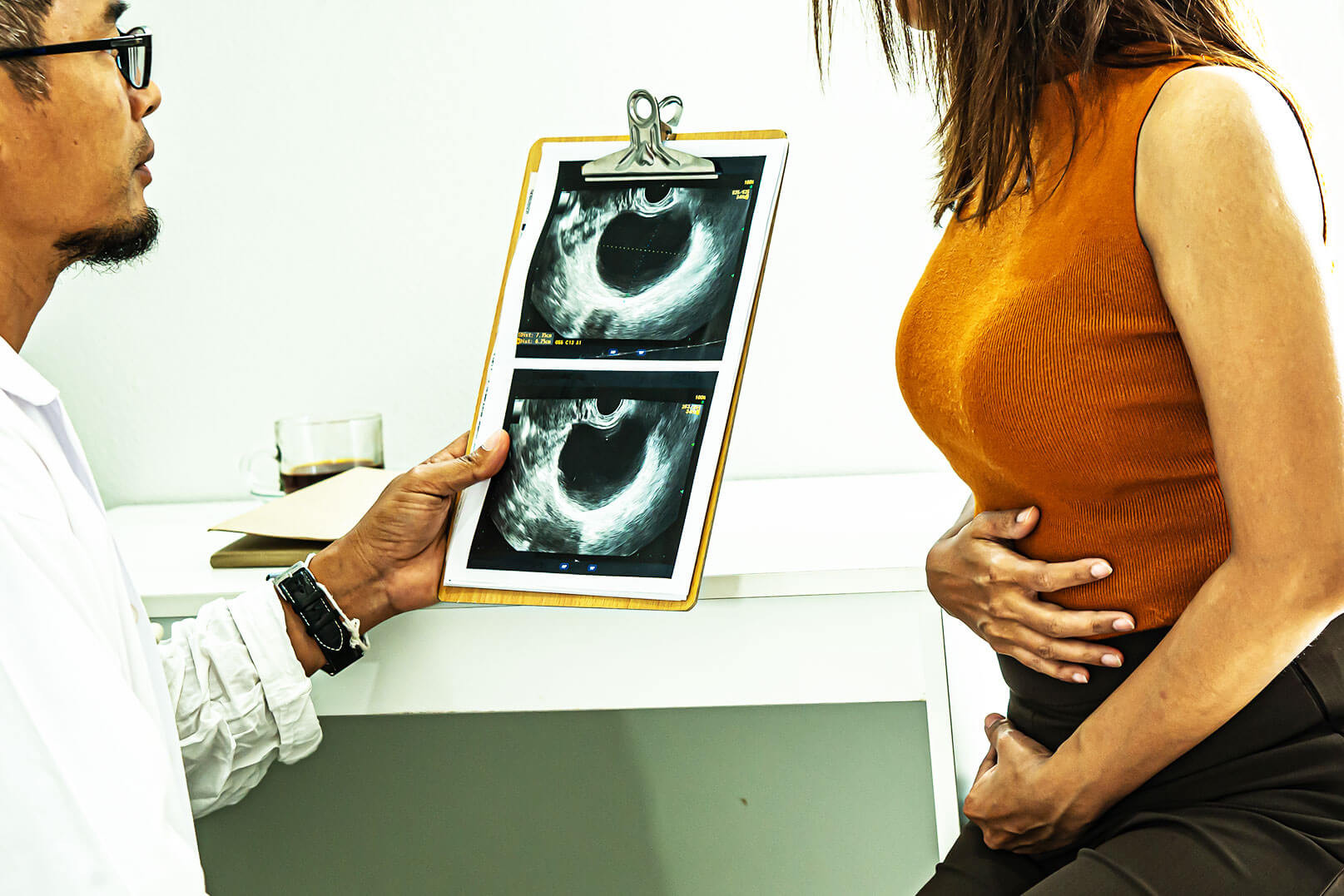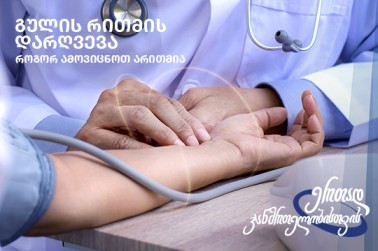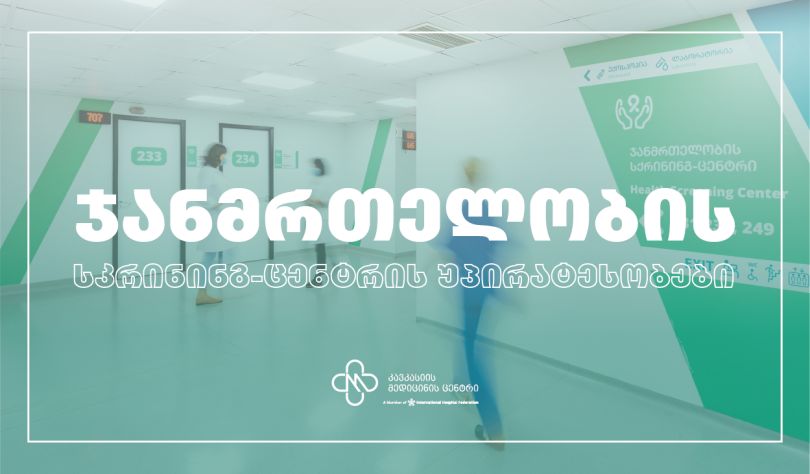


Blog
Treatment of Ruptured Ovarian Cyst
02 March 2020

Often women of different age categories face such a problem as rupture of an ovarian cyst - rupture of a fluid-filled pathological bubble-shaped formation. Experts say that in most cases, ovarian cysts themselves are harmless and disappear on their own. In other cases, including rupture, they can provoke dangerous consequences, and then women with a similar problem need immediate treatment.
As practice shows, with timely access to doctors and the provision of qualified medical care, negative consequences, especially the damage to the reproductive health of women, may be avoided. For an independent primary diagnosis of rupture of an ovarian cyst, it is necessary to know the basic information about this pathology in order to correctly and, most importantly, timely notice the problem and immediately seek advice from a medical center. In this article, you will learn about the causes, symptoms, and signs of rupture of an ovarian cyst, as well as what methods of diagnosis and treatment of rupture of an ovarian cyst are used by modern medical institutions abroad.
Causes of Ovarian Cyst Rupture
The nature of the appearance of the ovarian cyst, as well as its rupture, is not completely determined. The development of cysts is associated with the hormonal imbalance of the patient, but, as mentioned earlier, some types of cysts are not dangerous and may resolve on their own, depending on the menstrual cycle.
As for those dangerous types of cysts, including functional tumors (including follicular cysts and corpus luteum cysts), which are usually prone to rupture, external and internal factors that cause ovarian cyst rupture occur. Let’s discuss each category.
External causes of rupture of an ovarian cyst include factors that increase intra-abdominal pressure, namely:
Among the internal causes, experts distinguish the following:
If you have previously been diagnosed with an ovarian cyst, be more attentive to your body to avoid rupture of the cyst.
Symptoms and Signs of Rupture of an Ovarian Cyst
Ovarian cyst may rupture at any time of the day, and this happens very spontaneously and, as a rule, is accompanied by sudden, sharp and intense pain in the lower abdomen (the so-called “acute abdomen”) and in the pelvic area (pain may also be present in the lower back or inner thigh.)
Of the other symptoms, experts underline the following:
Cyst rupture is accompanied by bleeding into the peritoneal cavity, so after the onset of the above symptoms it is necessary to immediately call specialists and carry out further diagnostics. Important: it is worth minimizing physical activity before providing medical care, because bleeding into the peritoneal cavity may have serious consequences for the body.
Diagnostic Methods for Rupture of an Ovarian Cyst
If you feel a sharp abdominal pain and it seems to you that you have had an ovarian cyst rupture (even if you have not been diagnosed with it before), immediately contact a specialist. Doctors at CMC Hospital always on time and with maximum accuracy diagnose the patient's condition with a likely rupture of the ovarian cyst and prescribe an individual treatment regimen based on the overall clinical picture.
Gynecologists at CMC Hospital diagnose the patient’s condition in several stages. First, your assisting physician will ask about your medical history and your symptoms. Be sure to mention if you know that you have previously been diagnosed with an ovarian cyst. Next, an examination will be offered, during which the diagnosis of rupture of the ovarian cyst will be confirmed if:
Treatments for Ovarian Cyst Rupture at CMC Hospital
If you are diagnosed with a complex condition of rupture of an ovarian cyst, you may need medical help with obligatory hospitalization. In this case, gynecologists at CMC Hospital offer the following methods of treating ovarian cyst rupture:
If abdominal bleeding is detected, your doctor at CMC Hospital may schedule an operation. As a rule, this is laparoscopy. The doctor makes small incisions on the abdomen while you are under general anesthesia. Using certain tools, the doctor controls the bleeding through these incisions and removes blood or fluid clots from ruptured ovarian cysts. Then the doctor at the CMC Hospital may remove the cyst or the entire ovary (in severe forms of bleeding, when it is not possible to save the organ).
The Consequences of Rupture of an Ovarian Cyst
Specialists at CMC Hospital always approach the treatment as individually as possible in each particular case, which helps to reduce the likelihood of undesirable consequences of rupture of an ovarian cyst. They always choose the most suitable method of treatment and maximize the functionality of the damaged ovary.
However, if you do not diagnose and treat the ovarian cyst rupture in a timely manner, it can lead to serious consequences for the woman’s body and her reproductive health:
The above-mentioned certain consequences of rupture of an ovarian cyst are dangerous for women's health. But it should be remembered that to these results may as a rule lead the neglected state of rupture of the ovarian cyst, which was not diagnosed and treated in a timely manner. In other cases, all this may be avoided.
Prevention Repeated Rupture of Ovarian Cyst
You should pay attention to the fact that if you have already been diagnosed with an ovarian cyst or even a rupture, and at the same time you were provided with timely medical care and there were no negative consequence, this does not guarantee the absence of a reappearance of the pathology.
If you have a tendency towards such pathologies, we recommend that you treat your body as attentively as possible, listen to its changes and, if in doubt or complaints, consult your doctor.
Specialists at CMC Hospital recommend that patients with similar problems undergo scheduled examinations by a gynecologist at least twice a year, which will help to determine the presence of an ovarian cyst in a timely manner and prevent ovarian cyst rupture. Other recommendations for the prevention of pathology:
Following these simple rules, you can maintain your health for years.
As practice shows, with timely access to doctors and the provision of qualified medical care, negative consequences, especially the damage to the reproductive health of women, may be avoided. For an independent primary diagnosis of rupture of an ovarian cyst, it is necessary to know the basic information about this pathology in order to correctly and, most importantly, timely notice the problem and immediately seek advice from a medical center. In this article, you will learn about the causes, symptoms, and signs of rupture of an ovarian cyst, as well as what methods of diagnosis and treatment of rupture of an ovarian cyst are used by modern medical institutions abroad.
Causes of Ovarian Cyst Rupture
The nature of the appearance of the ovarian cyst, as well as its rupture, is not completely determined. The development of cysts is associated with the hormonal imbalance of the patient, but, as mentioned earlier, some types of cysts are not dangerous and may resolve on their own, depending on the menstrual cycle.
As for those dangerous types of cysts, including functional tumors (including follicular cysts and corpus luteum cysts), which are usually prone to rupture, external and internal factors that cause ovarian cyst rupture occur. Let’s discuss each category.
External causes of rupture of an ovarian cyst include factors that increase intra-abdominal pressure, namely:
- Active sports activity;
- Excessive physical activity;
- Frequent sexual activity or active sexual act;
- Abdominal trauma;
Among the internal causes, experts distinguish the following:
- Hormonal imbalance;
- Inflammation;
- The presence of gynecological diseases;
- Problems regarding the menstrual cycle.
If you have previously been diagnosed with an ovarian cyst, be more attentive to your body to avoid rupture of the cyst.
Symptoms and Signs of Rupture of an Ovarian Cyst
Ovarian cyst may rupture at any time of the day, and this happens very spontaneously and, as a rule, is accompanied by sudden, sharp and intense pain in the lower abdomen (the so-called “acute abdomen”) and in the pelvic area (pain may also be present in the lower back or inner thigh.)
Of the other symptoms, experts underline the following:
- Loss of consciousness due to sharp pain;
- Dizziness;
- Pallor or blueness;
- Lowering blood pressure;
- Ride of the body temperature;
- Rapid heartbeat;
Cyst rupture is accompanied by bleeding into the peritoneal cavity, so after the onset of the above symptoms it is necessary to immediately call specialists and carry out further diagnostics. Important: it is worth minimizing physical activity before providing medical care, because bleeding into the peritoneal cavity may have serious consequences for the body.
Diagnostic Methods for Rupture of an Ovarian Cyst
If you feel a sharp abdominal pain and it seems to you that you have had an ovarian cyst rupture (even if you have not been diagnosed with it before), immediately contact a specialist. Doctors at CMC Hospital always on time and with maximum accuracy diagnose the patient's condition with a likely rupture of the ovarian cyst and prescribe an individual treatment regimen based on the overall clinical picture.
Gynecologists at CMC Hospital diagnose the patient’s condition in several stages. First, your assisting physician will ask about your medical history and your symptoms. Be sure to mention if you know that you have previously been diagnosed with an ovarian cyst. Next, an examination will be offered, during which the diagnosis of rupture of the ovarian cyst will be confirmed if:
- There is pain in the ovary area, while the doctor determines a dense formation that has a round or irregular shape;
- There are indicators of getting blood or contents of the cyst into the peritoneal cavity;
- There is pain during examination of the posterior vaginal fornix;
- Ultrasound reflects blood in the abdominal cavity;
Treatments for Ovarian Cyst Rupture at CMC Hospital
If you are diagnosed with a complex condition of rupture of an ovarian cyst, you may need medical help with obligatory hospitalization. In this case, gynecologists at CMC Hospital offer the following methods of treating ovarian cyst rupture:
- Medications, including hormonal, anti-inflammatory and antigonadotropic drugs (depending on the clinical picture of the disease);
- Monitoring of heart rate and other vital signs;
- Blood tests in order to monitor red blood cell counts;
- Repeated ultrasound to check for symptoms of repeated bleeding in the abdominal cavity.
If abdominal bleeding is detected, your doctor at CMC Hospital may schedule an operation. As a rule, this is laparoscopy. The doctor makes small incisions on the abdomen while you are under general anesthesia. Using certain tools, the doctor controls the bleeding through these incisions and removes blood or fluid clots from ruptured ovarian cysts. Then the doctor at the CMC Hospital may remove the cyst or the entire ovary (in severe forms of bleeding, when it is not possible to save the organ).
The Consequences of Rupture of an Ovarian Cyst
Specialists at CMC Hospital always approach the treatment as individually as possible in each particular case, which helps to reduce the likelihood of undesirable consequences of rupture of an ovarian cyst. They always choose the most suitable method of treatment and maximize the functionality of the damaged ovary.
However, if you do not diagnose and treat the ovarian cyst rupture in a timely manner, it can lead to serious consequences for the woman’s body and her reproductive health:
- The appearance of anemia as a result of a low hemoglobin level;
- Surgical removal of the ovary;
- Peritonitis - purulent inflammation in the abdominal cavity;
- Sepsis;
- Infertility;
- Subsequent ectopic pregnancy.
The above-mentioned certain consequences of rupture of an ovarian cyst are dangerous for women's health. But it should be remembered that to these results may as a rule lead the neglected state of rupture of the ovarian cyst, which was not diagnosed and treated in a timely manner. In other cases, all this may be avoided.
Prevention Repeated Rupture of Ovarian Cyst
You should pay attention to the fact that if you have already been diagnosed with an ovarian cyst or even a rupture, and at the same time you were provided with timely medical care and there were no negative consequence, this does not guarantee the absence of a reappearance of the pathology.
If you have a tendency towards such pathologies, we recommend that you treat your body as attentively as possible, listen to its changes and, if in doubt or complaints, consult your doctor.
Specialists at CMC Hospital recommend that patients with similar problems undergo scheduled examinations by a gynecologist at least twice a year, which will help to determine the presence of an ovarian cyst in a timely manner and prevent ovarian cyst rupture. Other recommendations for the prevention of pathology:
- To live an active lifestyle;
- Prefer proper and balanced nutrition;
- Do sports;
- Have a moderate and regular sexual life.
Following these simple rules, you can maintain your health for years.
Other Blogposts

Explore Now
სიცოცხლის რიტმი: რა უნდა ვიცოდეთ გულის არითმიის შესახებ?
18 July 2024
არითმია, ანუ არარეგულარული გულისცემა, გულის ნორმალური რიტმის ნებისმიერი ტიპის დარღვევას ეწოდება. ფიზიოლოგიურად გულისცემის სიხშირე შეიძლება გაიზარდოს ფიზიკური აქტივობის შესაბამისად ან შემცირდეს მოსვენებისა და ძილის დროს. ასევე, გულისცემის გამოტოვების იშვიათი შეგრძნება, უმეტესწილად არ უკავშირდება პათოლოგიურ ცვლილებებს, თუმცა, ხშირი არარეგულარული რითმი ძირითადად მიგვანიშნებს არითმიებზე, რა დროსაც გულისცემის პათოლოგიური ცვლილების გამო, ორგანოები ვერ მარაგდება საკმარისი რაოდენობის სისხლით.

Explore Now
ბავშვი ინსულტის დიაგნოზით: 13 წლის მოზარდის განკურნების ისტორია
05 October 2022
2022 წლის დადგომას ველოდით. ალექსანდრესთან ერთად ნაძვის ხის აწყობას ვგეგმავდით. მოულოდნელად, მისი ოთახიდან უცნაური ხმები შემომესმა. სასწრაფოდ შევაღე კარი და ვნახე სრულიად გაშეშებული ჩემი შვილი, რომელიც ერთ წერტილში იყურებოდა და უემოციოდ იჯდა. მან ჩვენი ყურადღების მიქცევა მხოლოდ ხელების ოდნავი მოძრაობით შეძლო.

Explore Now
Benefits of a screening center
15 November 2021
Caucasus Medical Center plays a huge role in the development of the screening center. Here, diagnostics are performed using modern high-tech devices and the error is minimized. Also, the screening center is distinguished by the team of multidisciplinary doctors. With their joint involvement, the treatment issues of the patients are discussed.



